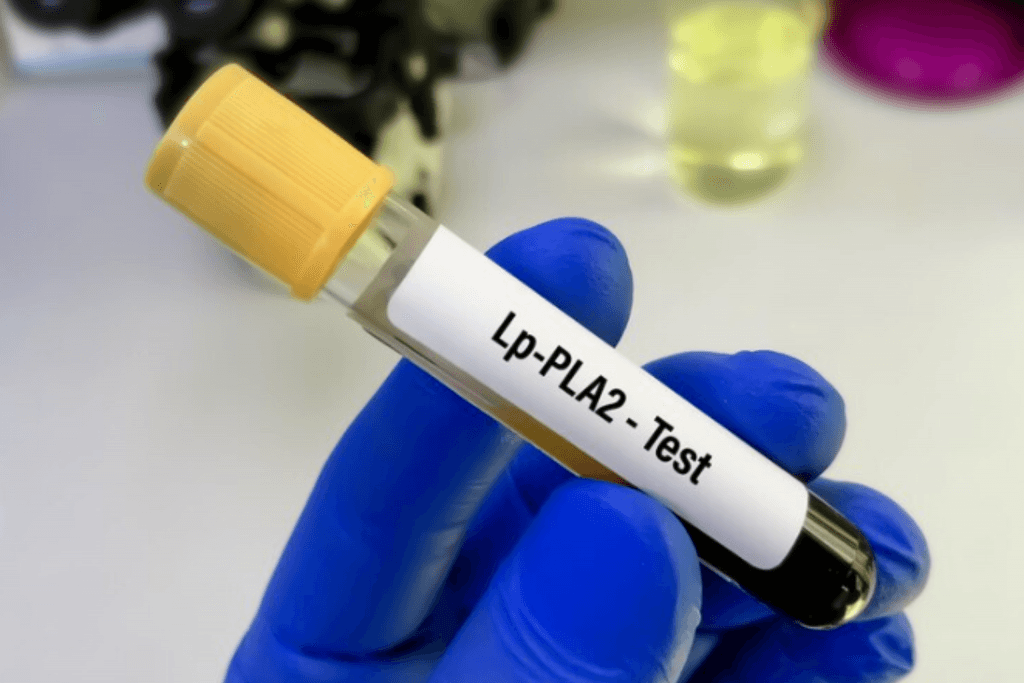Lipoprotein-associated phospholipase A2
(Lp-PLA2) Testing

Home – Heart-Related Tests – Lipoprotein-Associated Phospholipase A2 (Lp-PLA2)
West Midlands
Advanced Cardiovascular Risk Assessment
At OneMedicine, we provide comprehensive cardiovascular care using the latest diagnostic tools to assess your heart health. One of the most cutting-edge tests we offer is the Lipoprotein-Associated Phospholipase A2 (Lp-PLA2) test, an advanced marker that measures inflammation within your blood vessels.
Understanding your Lp-PLA2 levels can give vital insights into your risk for heart attacks, strokes, and other cardiovascular conditions, particularly in individuals at high or medium risk for heart disease.
What is Lp-PLA2?
Lipoprotein-Associated Phospholipase A2 (Lp-PLA2) is an enzyme produced in your body that is closely linked to inflammation in your arteries. Inflammation plays a crucial role in the development of atherosclerosis—the hardening and narrowing of arteries due to plaque buildup. Elevated Lp-PLA2 levels suggest that this inflammation is occurring, which can lead to more significant heart health concerns, such as the rupture of unstable plaques in your arteries, potentially causing a heart attack or stroke.
Why is Lp-PLA2 Testing Important for Your Heart Health?
- Checking heart risk: Elevated Lp-PLA2 levels are a strong indicator of increased cardiovascular risk, particularly for heart attacks and strokes. This test is especially useful for people who may already have some risk factors for heart disease, such as high cholesterol, diabetes, or a family history of cardiovascular problems. By combining Lp-PLA2 testing with other heart health assessments, Dr. Ibrar Ahmed can get a clearer picture of your risk, even if traditional tests like cholesterol or blood pressure seem normal.
- Useful for specific groups: The Lp-PLA2 test is particularly beneficial for individuals who fall into the medium-risk category for heart disease. These are people who might not have an immediate history of cardiovascular issues but have some risk factors. For example, people with borderline cholesterol or those with a family history of heart disease may not always show clear risk through traditional testing. By checking Lp-PLA2, Dr Ahmed can uncover hidden risks that may require proactive management to prevent serious heart conditions.
- Guiding treatment: If your Lp-PLA2 levels are found to be high, Dr Ahmed may recommend targeted strategies to reduce your cardiovascular risk. This could include lifestyle changes, such as adopting a heart-healthy diet, increasing physical activity, and quitting smoking. In some cases, medications may be necessary to manage both inflammation and cholesterol levels, helping to stabilise the plaque in your arteries and lower the risk of heart attacks or strokes.
- Tracking progress: The Lp-PLA2 test is not only useful for initial risk assessment but also for monitoring your progress over time. If you’ve been working to improve your heart health through lifestyle changes or medications, checking your Lp-PLA2 levels can help track whether these efforts are lowering your inflammation and reducing your cardiovascular risk. A decrease in Lp-PLA2 levels over time is a positive indicator that your heart health is improving and that you are successfully managing your risk.
Cost
- Lp-PLA2 blood test £80
When should you get an ECG
While the Lp-PLA2 test is valuable for anyone concerned about their heart health, it is especially recommended for individuals who:
- Have multiple risk factors for heart disease, such as high cholesterol, diabetes, obesity, or smoking
- Have a family history of heart attacks or strokes
- Are considered to be at medium risk for cardiovascular disease but want a more detailed understanding of their inflammation levels
- Are already managing heart disease and need to monitor the effectiveness of their treatment
If you’ve experienced symptoms such as chest pain, shortness of breath, or palpitations, or if you fall into a high-risk group for heart disease, the Lp-PLA2 test can provide an extra layer of insight into your heart health.
Advanced expertise with Dr Ibrar Ahmed
At OneMedicine, you are under the expert care of Dr Ibrar Ahmed, a highly qualified cardiovascular specialist with a PhD in Cardiovascular Medicine. Dr Ahmed has extensive experience in diagnosing and managing complex heart conditions, and his research has been cited in prestigious medical guidelines, including the 2023 European Society of Cardiology Guidelines. His thorough understanding of advanced cardiovascular markers like Lp-PLA2 ensures that you receive the most accurate diagnosis and treatment plan.
Dr Ahmed combines his expertise in cutting-edge diagnostics with a holistic, patient-focused approach, ensuring that each patient receives personalised care based on their unique cardiovascular profile. Whether you’re at risk or managing an existing heart condition, Dr Ahmeds in-depth knowledge will guide you toward the best strategies for reducing inflammation and safeguarding your heart.
Get seen by Dr Ibrar Ahmed
Don’t wait until symptoms appear. If you have risk factors for heart disease, or if you want a comprehensive assessment of your cardiovascular health, the Lp-PLA2 test is a crucial step in understanding and managing your heart health.
By combining advanced diagnostic tools with expert care from Dr Ibrar Ahmed, we provide you with the knowledge and support to take control of your heart health and prevent serious cardiovascular events. Whether you’re managing known heart conditions or taking preventative steps, OneMedicine is here to guide you every step of the way.













